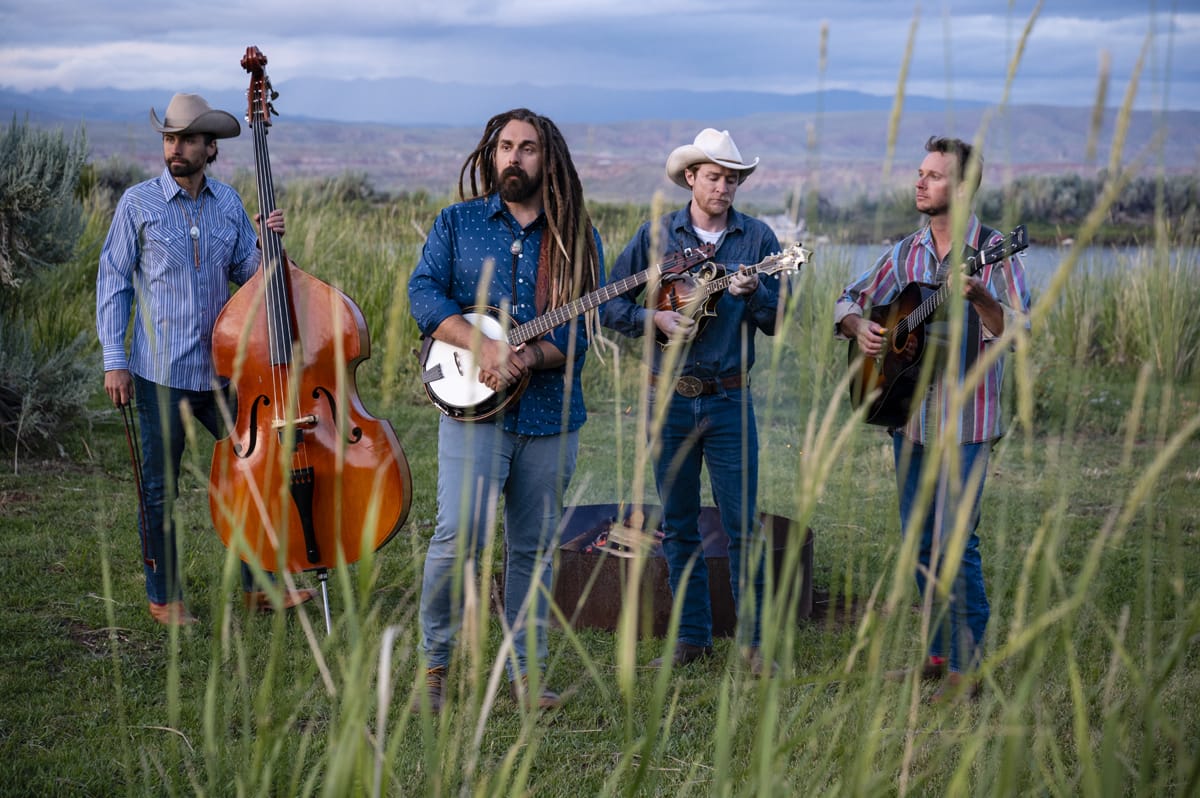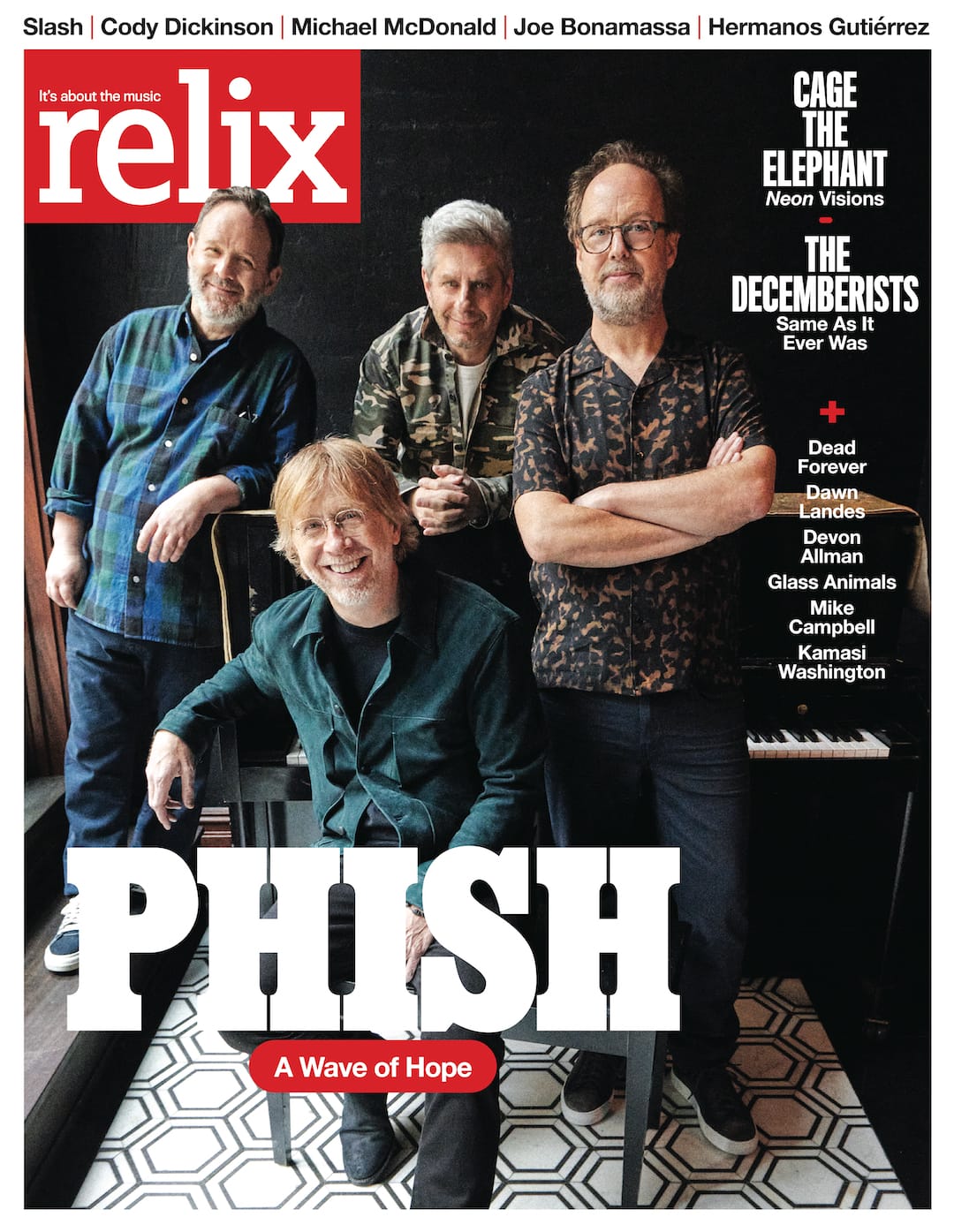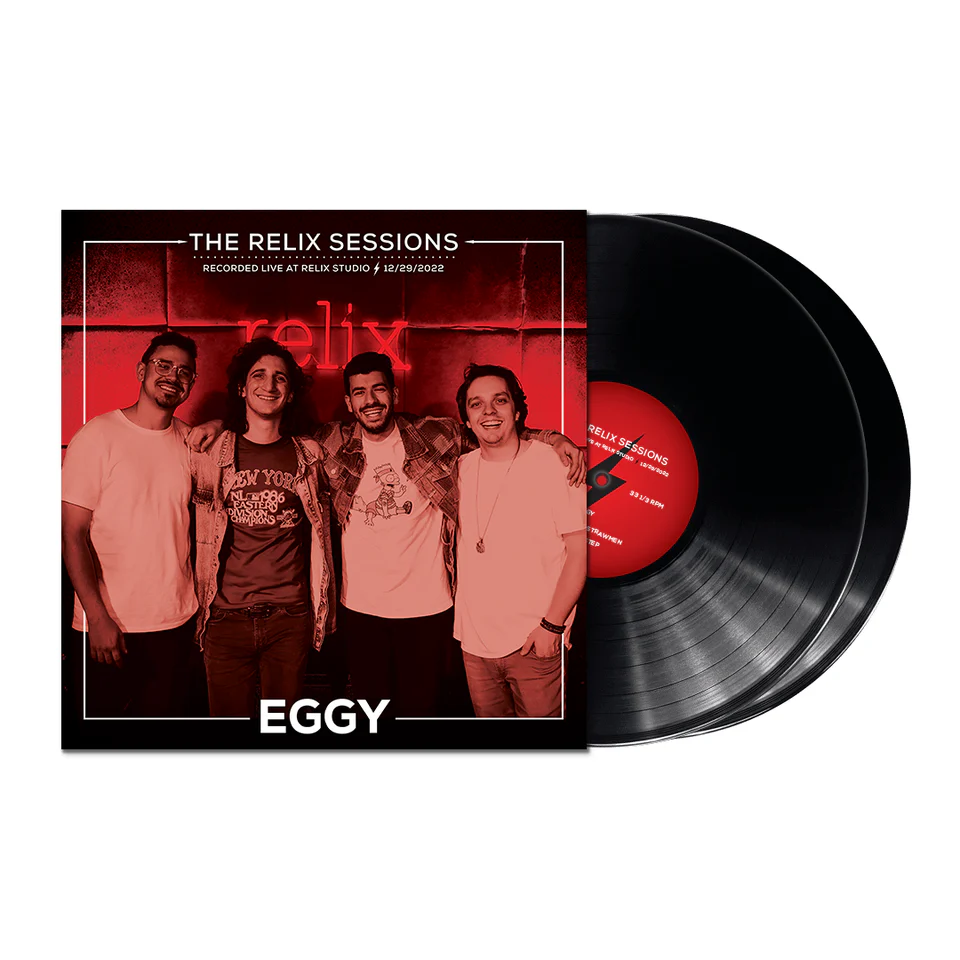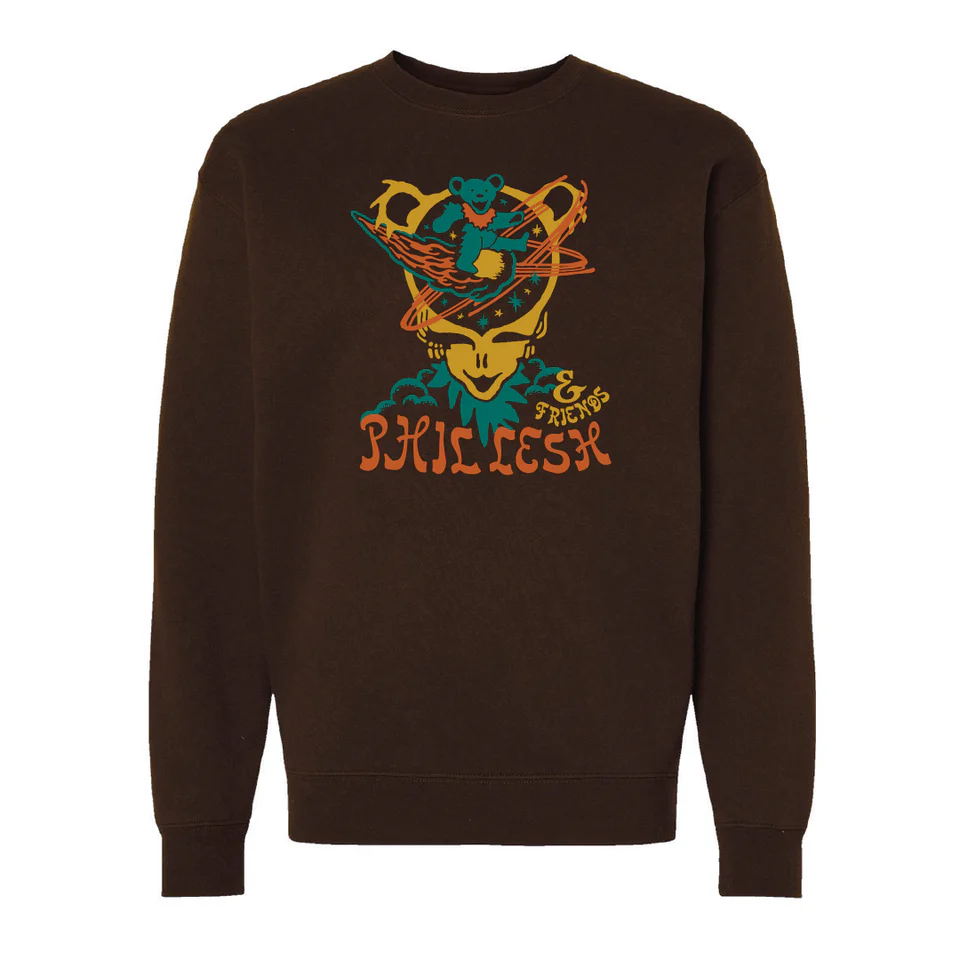Kitchen Dwellers: Rising Up to Paradise

The Kitchen Dwellers’ story begins in Bozeman, Mont. But more specifically, it begins in an actual kitchen.
“We came up with the name ‘Kitchen Dwellers’ because the kitchen was where we always liked to practice,” banjo player Torrin Daniels says. “And it was the only space big enough for all of us to stand together.”
With a population hovering near 40,000, Bozeman certainly had a small-town vibe, so their gig options were also limited. But, between house parties and a bar that would let them cut their teeth, they made due.
“It was a pretty regular thing for the cops to show up at a function that we were playing,” Daniels says.
Armed with that “make do with what you got” attitude, Kitchen Dwellers have been on a fierce rise over the last several years, fueled by the jam world’s renewed interest in bluegrass-based music from artists like Billy Strings, Greensky Bluegrass and, of course, enduring trailblazers like Leftover Salmon and Yonder Mountain String Band. During their time together, Kitchen Dwellers have already made choice appearances at marquee clubs across the country, as well as at high-profile string festivals like Colorado’s Telluride Bluegrass and Cumberland, Md.’s Delfest.
But, if you ask the members of the band about their origins, they’ll say that bluegrass or even bluegrass-based music wasn’t really on their radar at first. And you can often hear that mentality seep in—their songs have been known to stretch toward the 20-minute mark, boasting ethereal parts that could be plucked from a long-lost ‘70s Pink Floyd album or complex arrangements reminiscent of Phish’s early days. They also have no problem turning ‘90s staples like Matchbox 20’s “3 AM” or Nirvana’s “Breed” into blistering twang assaults should the mood strike them.
“We come from progressive rock and metal backgrounds,” says acoustic guitarist Max Davies. “So we’ve tried to write some songs that like the ‘one chord,’ which are some of the most fun moments of our shows—where we can take this ‘one chord jam.’ We also have other songs that are way more thought out, composed and have sections. That’s always been a huge passion of ours—taking the listener on a little journey through a composed part. That’s the stuff that we grew up on.”
The Kitchen Dwellers met at Montana State University back in 2010—Daniels and mandolinist Shawn Swain actually connected during their freshman year, in their first class on their first day of college. It was kismet. Daniels was a mandolin player too, but had recently bought a banjo and they just started playing. They discovered early on that they didn’t necessarily want to emulate bluegrass music and its traditions, as much as they respected the genre. Tradition is tradition, but there was no reason to act like purists.
The quartet has never incorporated a drummer—rounding out the group is Joe Funk, who anchors their rhythms on the upright bass. They started playing out where they could—once again, Bozeman is relatively small—but they were able to secure shows at a local burger and music joint, Haufbrau House, as well as at those aforementioned house parties. Before Davies joined, they played with another guitarist. However, they amicably parted ways in 2013, and Davies, who had known and played with the guys around town, joined them, at first, on a temporary basis. Swain says that was a pivotal moment in the band’s musical growth.
“I remember inviting Max to play some shows and he was like, ‘Yeah, I’ll play with you guys until you find the full-time guy,’” Swain recalls. “And then I just kind of stopped looking and he never quit. The first gig that Max ever played with us was this tiny, little local festival in Montana. And something about that felt like, ‘Now this is going to be a permanent thing.’”
For years, they’d blanket the Midwest and Mountain West with as many gigs as they could get, covering Montana, Wyoming, Colorado and Wisconsin. In 2014, they got invited to the “band contest” at Delfest, where heavy-hitters like The String Cheese Incident, Béla Fleck and Abigail Washburn, the Del McCoury Band and Ricky Skaggs with Bruce Hornsby were also slated to appear. By 2016, they had started crossing over into the jam-rock world on a national level, pairing themselves with the electric, psychedelic dwellings of Twiddle and strategically booking Phish aftershows in popular destinations. In 2018, that extended into opening spots for Pigeons Playing Ping Pong, and Kitchen Dwellers have continued to remain a visible presence at roots-based music events around the country ever since.
“There’s been different eras of live music,” Swain says. “But there’s definitely more of an emphasis on live playing right now than there ever has been in the history of produced music.”
***
As Kitchen Dwellers have grown into an in-demand live act during the back half of the last decade, securing more and more shows across the country, they have remained committed to progressing as a studio band as well. In 2017, they hooked up with Leftover Salmon’s Andy Thorn to produce Ghost in the Bottle, a fan-favorite and a window into their early talents. Instead of simply recreating their live sets, the band decided early on to make sure that their studio albums were incredibly polished and more poignant than your average jamband album.
In addition to a pair of full-length releases, 2019’s Muir Maid and 2022’s Wise River, they’ve also issued two Reheated tribute EPs, which celebrated the music of The Band and Pink Floyd. Covers can be a bit tricky to turn into bluegrass-style arrangements, and Swain says that it usually takes a few days to get an arrangement down that everyone is comfortable with.
The challenge that any band has when they’re growing and finding themselves onstage is how to turn that vibe into something that can be captured in the studio. It’s not easy, and it certainly wasn’t easy for the Kitchen Dwellers, Swain says. But he thinks they’ve finally cracked the code. They just needed a new approach.
So it makes sense that Kitchen Dwellers’ newest release, Seven Devils, is their most ambitious to date. Drawing inspiration from Dante’s Inferno, the 12-song offering is a bluegrass-filled plunge into a much more serious realm. Inferno is about reconciling with the concept of hell, the notion of sin and the path to becoming a better person. Seven Devils explores those themes as well, sprinkling a bit of optimism over those weighty topics.
Daniels says that the inspiration for their heady album theme came not only from recognizing how many places throughout the country are called “Seven Devils” but also from the concept of the seven deadly sins.
“The number seven is a really important number in tons of cultures around the world and has been for a very long time,” he says. “I started to draw these parallels with the other songs that we were writing for the album. Human existence and suffering is centered around a lot of these themes. Whether you want to consider them sins or not is up to you, but a lot of it can be centered around lust, greed, wrath, anger or pride—any of us could be equally guilty of all those things.”
Last year, the group hunkered down at producer Glenn Brown’s studio in East Lansing, Mich., for a pair of sessions. Brown, who has put his stamp on recent Billy Strings and Greensky Bluegrass albums, knew how to properly capture their acoustic sound.
The producer helped flesh out some of the ideas the band brought in and, by the end of the first nine-day stint, he says they were in a completely different mental space.
“We could see there was a depth of emotion to what these guys have that’s not just about fire,” Brown recalls. “Of course, we wanted a bunch of fire. I wanted to bring that forward a little bit and get some of the emotional value to come to arise at a higher level.”
On certain songs, Brown mixed in some strings, a simple move that ended up having a profound effect on the band.
“After it played, I turned around and three of them were crying,” he recalls. “They had tears in their eyes because of just how beautiful and emotionally powerful it was.”
The album also includes a gong on title[1]track “Seven Devils” and a penny whistle and bodhrán drum on “Meagher’s Reel” and “Waterford Son.” And rising songwriter Lindsay Lou lent her vocal services to a few different selections.
“We treat this as one concept instead of just saying, ‘Here are our new songs.’ We said, ‘Here is a piece of artwork that can stir up some thought,’” Daniels explains.
“We’ve been trying to hone on our craft, and that means being more emotive and getting quality songs out there,” Davies adds. “And that requires you to dig deep and really think about what it is you’re trying to say. The world is an ever-evolving, chaotic place. And I think that this music reflects that. We’re just being bombarded by a lot of information and technology. Something that we’ve talked about as a band is looking a little bit inward.”
For Swain, it’s about gelling in a way that melds the band’s two worlds in the most natural way possible.
“On previous studio works, we weren’t really able to get the same point across that we were able to get live,” he says. “And I think that’s the case for a lot of bands. I feel differently about this upcoming one, where you’re finally able to capture whatever this whole live sound is and bring it to a record. It’s the closest thing to the live experience that we’ve been able to bring out of the studio, and it sounds just as big. Before I felt like they were really two separate things. And now I think they are finally starting to merge as one.”
***
Kitchen Dwellers’ 2024 itinerary is already impressive. They have confirmed key gigs opening for The Infamous Stringdusters and Leftover Salmon at the famed Ryman Auditorium in Nashville and will support Widespread Panic during their annual weekend in Mexico, Panic en La Playa. Then they’ll headline bigger spaces in a mix of markets this spring.
The members of Kitchen Dwellers have also already been able to bring the new connections that they recently fostered in the studio back to the stage, strengthening their live chemistry and tightening their improv skills—which explains how they’re able to stretch songs beyond the 15-minute mark nightly and bounce between seemingly unrelated covers with ease.
“In the very beginning, it was just like, ‘Everyone make as much noise as possible,’” Swain says. “And now I think that it’s finally settled. Somebody will start off with an idea, it gets going, and then we all build around that and kind of pass it around. And then, sometimes, someone’s able to add one idea on top of another; it’s slightly different, but it still works great. I think that’s constantly evolving for the better.”
Yet, while barnstorming the country and 14 years of camaraderie have certainly contributed to their success, the musicians also understand that the band’s recent surge in popularity may also simply just be a sign of the times. “I have this theory that bluegrass and roots music become popular during times of depression in the country,” Swain says. “People like to, for one reason or another—whether it’s conscious or not—get back to basic things that are uniquely American during these kinds of times. And we’re going through that right now.” Yet, at the end of the day, it’s Kitchen Dwellers’ perseverance, chemistry and singular approach to a traditional art form that has truly allowed them to stand out in an increasingly crowded field
“Being a bluegrass or folk musician in the modern age, I’m super grateful for it,” Daniels says. “I’ve always taken pride in how unique our band is and that we really are not trying to be anyone else. There are a lot of people out there that get outside influence from social media and things like that. They try to sound just like somebody else and think that is what people want to hear. People will go, ‘This is what sounds good right now, so this is how I should sound.’ But, in reality, the only thing that sets you apart in a world so oversaturated with media and content is actually how different or unique you are.”




















